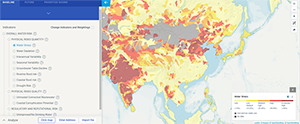Water Resources: Structure
Structure
| Officer in Charge | Kenji Kobayashi (Executive Vice President, Corporate Functional Officer, CSEO (concurrently) Capital Alliances) |
|---|---|
| Deliberative Body (A subcommittee under the Executive Committee, a management decision-making body) | Sustainability Committee Important matters related to water resources deliberated by the Sustainability Committee are formally approved by the Executive Committee and put forward or reported to the Board of Directors based on prescribed standards. |
| Department in Charge | Sustainability Dept. |
Risk Management
When reviewing and making decisions on investment and financing proposals, MC conducts a comprehensive screening process that considers both economic aspects and ESG factors. From a water resources perspective, MC has established a screening process that first confirms compliance with environmental regulations related to water discharge and water withdrawals, which serve as confirmation of regulatory risks. The process also evaluates the impact of water withdrawals on surrounding communities, local society, biodiversity, and the effects of climate change on the freshwater environment, which serves as confirmation of physical risks. For this screening, particularly for businesses located in areas with high levels of water stress, MC uses the World Resources Institute (WRI) Aqueduct tool in order to incorporate external perspectives. Furthermore, MC strives to monitor existing operating companies and contribute to their improvement, in addition to reviewing new investment and divestment proposals.
MC also conducts annual surveys of suppliers to confirm their compliance with the Mitsubishi Corporation Policy for Sustainable Supply Chain Management. This policy outlines MC’s approach to addressing human rights, labor rights, and environmental issues in supply chains for products that carry high environmental or social risks. The survey items include consideration of impacts on local communities and ecosystems, whether suppliers have policies, strategies, and guidelines to prevent river pollution, whether they set and monitor water consumption reduction targets, and the content of any water-related surveys they conduct.
Water Stress Analysis
In addition to company-wide efforts to reduce water consumption, MC conducted a water stress analysis of operating companies with high water withdrawal levels in order to identify priority reduction targets.
The process and several results are described below.
Process of the Analysis
The top 20 operating companies in terms of water withdrawal amounts were identified. These companies account for approximately 99.2% of the total water withdrawal by companies under MC's financial control.
The WRI Aqueduct water stress analysis tool was used to determine whether any of the 20 companies were located in areas of high water stress.
For any business located in an area with high water stress (rated "High" or above), measures to reduce water consumption were implemented along with specific reduction targets.

Results of the Analysis
According to Aqueduct assessment, a Thai tapioca starch manufacturing and processing company is located in an area with high water stress. The company operates in the Mekong River Basin, which is generally at high risk of water shortages, drought, and inadequate wastewater treatment. However, based on an assessment of operational impacts using the WWF Water Risk Filter, and after considering business characteristics identified through site visits and interviews with management, the company's operational risk score was evaluated as “Low.“
Establishment of Targets and Initiatives to Reduce Water Consumption
The company has set a water recycling ratio target of 10% in order to reduce water consumption per unit of production volume. It is also promoting water reuse through initiatives such as recirculating water used to backwash microfiltration membranes.